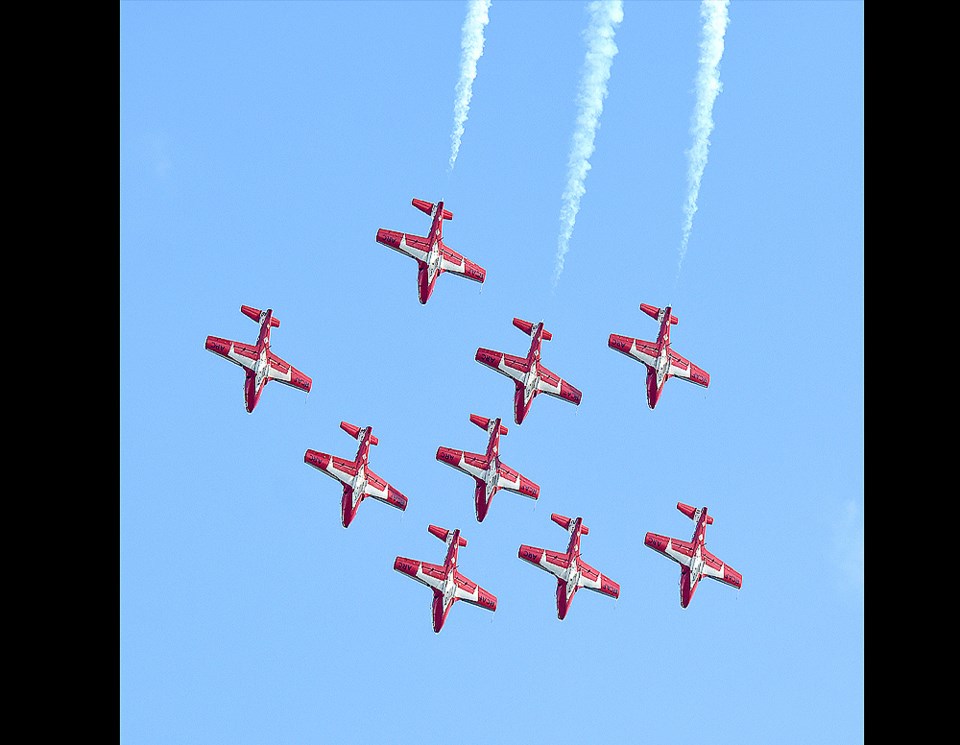MOOSE JAW — The Canadian Forces’ Snowbirds, 431 Air Demonstration Squadron, is heading to the Comox Valley from April 19 to May 11 to rehearse their moves over some non-prairie terrain prior to starting their touring season in mid-June.
“This year, we have a lot of newer members on the team, so (training) does require more flights,” said Captain Gabriel Ferris, the Snowbirds’ Public Affairs Officer. “As an approximation, it’s usually around 70 to 90 flights. It’s not about hours, but about the number of sorties.”
The Snowbirds roster this year (new positions are marked with an asterisk):
- *Snowbird 1 Team Lead: Major Brett Parker (Edmonton, AB)
- *Snowbird 2 Inner Right Wing: Capt Marc-André Plante (Chicoutimi, QC)
- Snowbird 3 Inner Left Wing: Captain Arpit Mahajan (Delta, BC)
- Snowbird 4 First Line Astern: Captain Patrice Powis-Clement (St. Joseph Island, ON)
- *Snowbird 5 Second Line Astern: Capt Thomas Thornton (Belleville, ON)
- Snowbird 6 Outer Right Wing: Captain Steven Sparks (Hamilton, ON)
- *Snowbird 7 Outer Left Wing: Capt Dominic Appolloni (Winnipeg, MB)
- Snowbird 8 Lead Solo: Captain Logan Reid (Victoria, BC)
- *Snowbird 9 Opposing Solo: Major Steve Hurlbut (Calgary, AB)
- Snowbird 10 Advance and Safety Pilot: Captain Erik Temple (Ottawa, ON)
- Snowbird 11 Advance and Safety Pilot: Captain Steve MacDonald (Kentville, NS)
The air demonstration shows are performed by Snowbirds 1 to 9. The five new positions on the team don’t mean new pilots — Major Parker, for example, has been Snowbird 7, Snowbird 3, and Snowbird 2 before taking on the team lead job this year — but rather pilots who are either new to the squadron or just to their place in the formations.
In mid-March, the Snowbirds announced they had been forced to postpone the start of their season. They said that their training schedule had been derailed by persistent inclement weather and ongoing adaptation to pandemic restrictions.
“There was a bit more snow this year, a lot of blowing snow that reduced the visibility,” said Ferris. “There was also a lot of ice on the runways that stopped us from flying, because if the runway is too slippery, then we cannot land or take off… So, we’re about a month late this year because of that.”
The show routine has been finalized, Ferris reported, and the team will spend their time in Comox tightening things up.
The personnel total is 24, including 10 maintenance technicians, a supply tech, and a truck driver for the 18-wheel mobile support vehicle.
“The truck driver drives all across Canada from coast to coast,” Ferris said. “We usually fly in the jets with the team, because there are 11 two-seat planes. There’s a technician on one side and the pilot on the other side. And we just fly from shore to shore like that, and the truck just tries to follow in the back.”
The 2022 show was worked out while flying in prairie conditions, so the Comox Valley training will give the team a chance to bring the planes closer and closer together in a wider variety of conditions. The Snowbirds have been training there since 1974 and consider it their second home.
It’s different, Ferris explained, to fly over water or mountains. Depth perception over water, for example, requires adjustment as compared to land — a major concern when the team is doing a loop that will finish at low altitude.
Unfortunately, there will not be a Moose Jaw show this year. However, when the team returns on May 11, they will be flying their show twice a day in Moose Jaw’s airspace — giving the local community a frequent view of their maneuvers. Ferris is hopeful that an accommodation will be worked out to have a designated spectator area that locals and school groups can visit to watch a performance.
Base rules still require full COVID-19 vaccination for all visitors, he explained, so the spectator area may have to be just outside the base area.
Follow the team on and to stay updated.
The 2022 airshow schedule is at .




